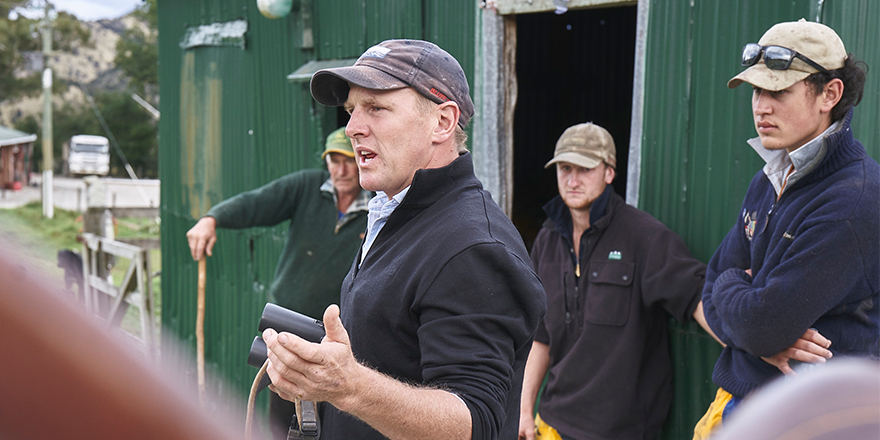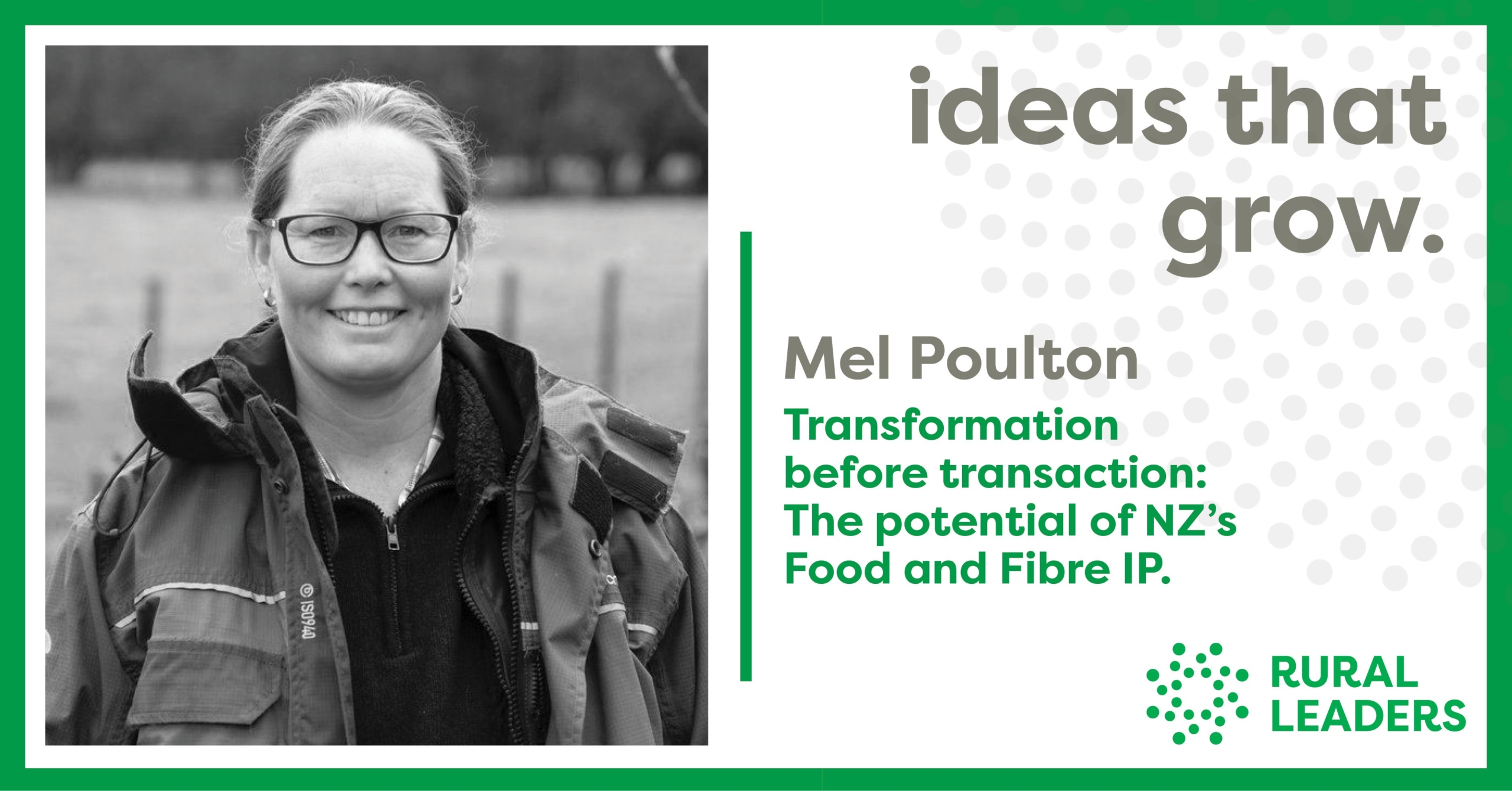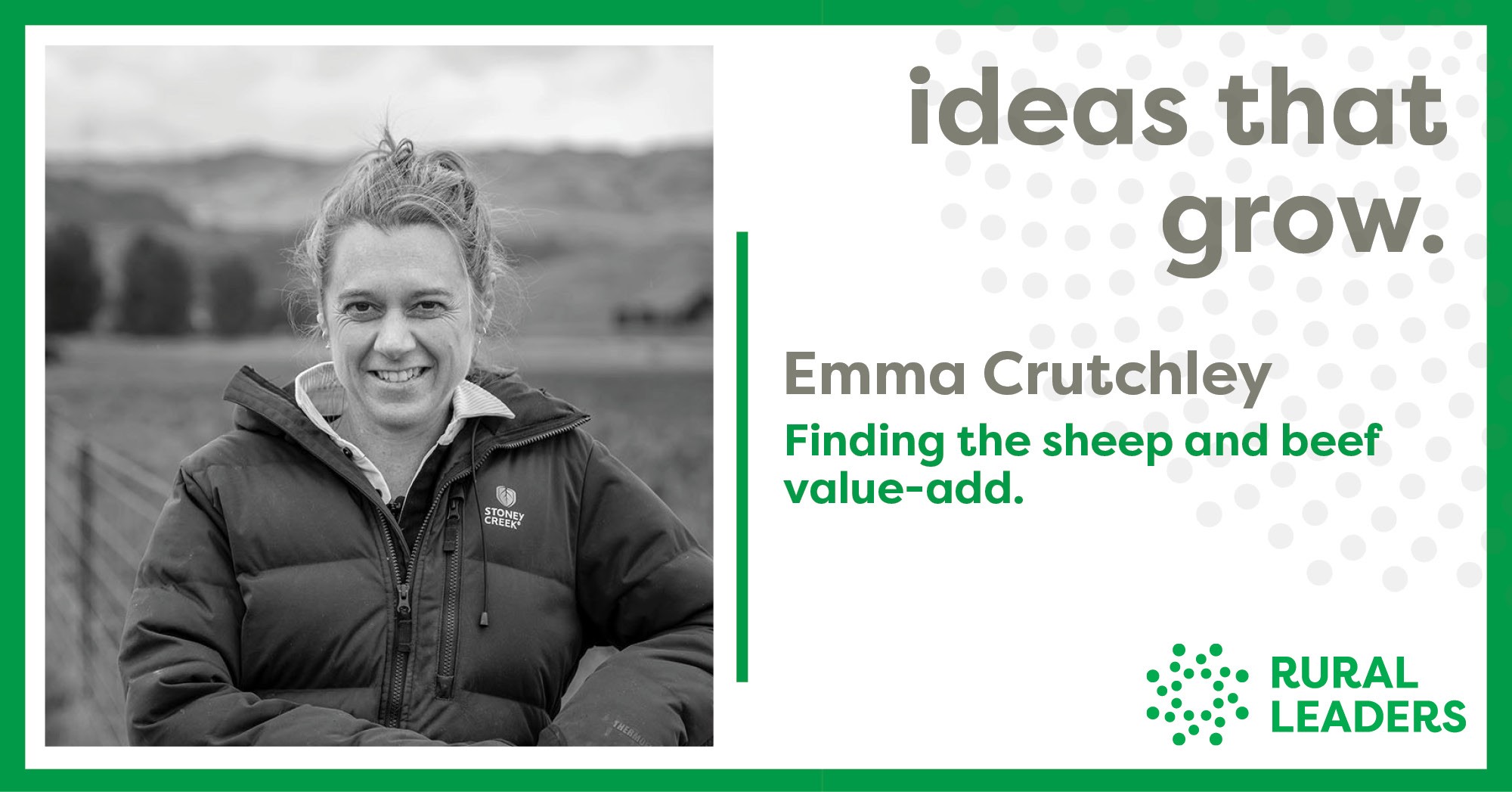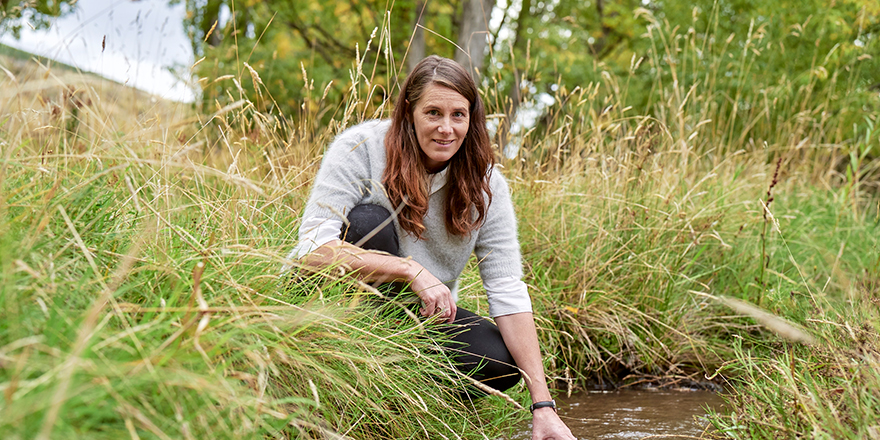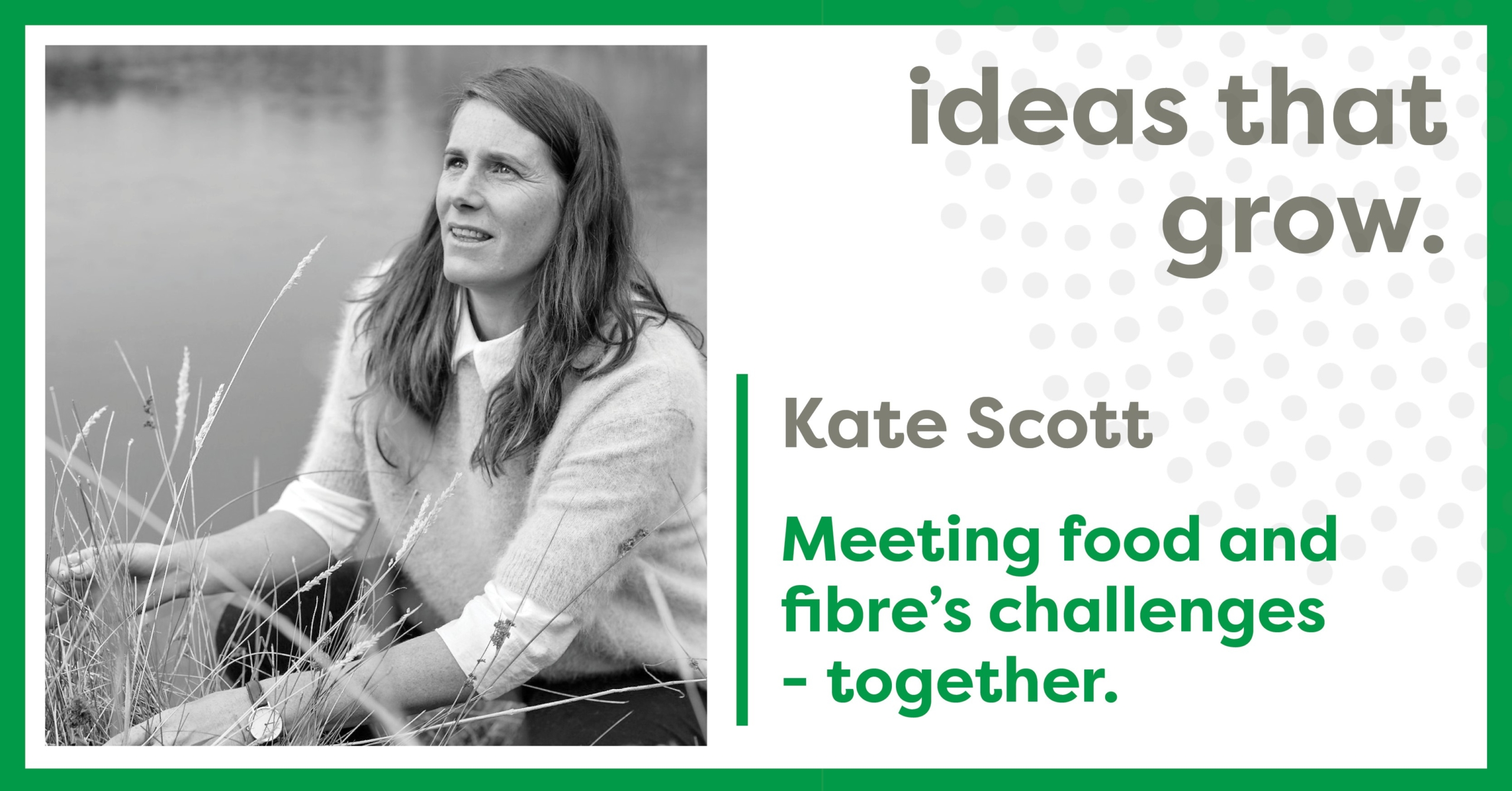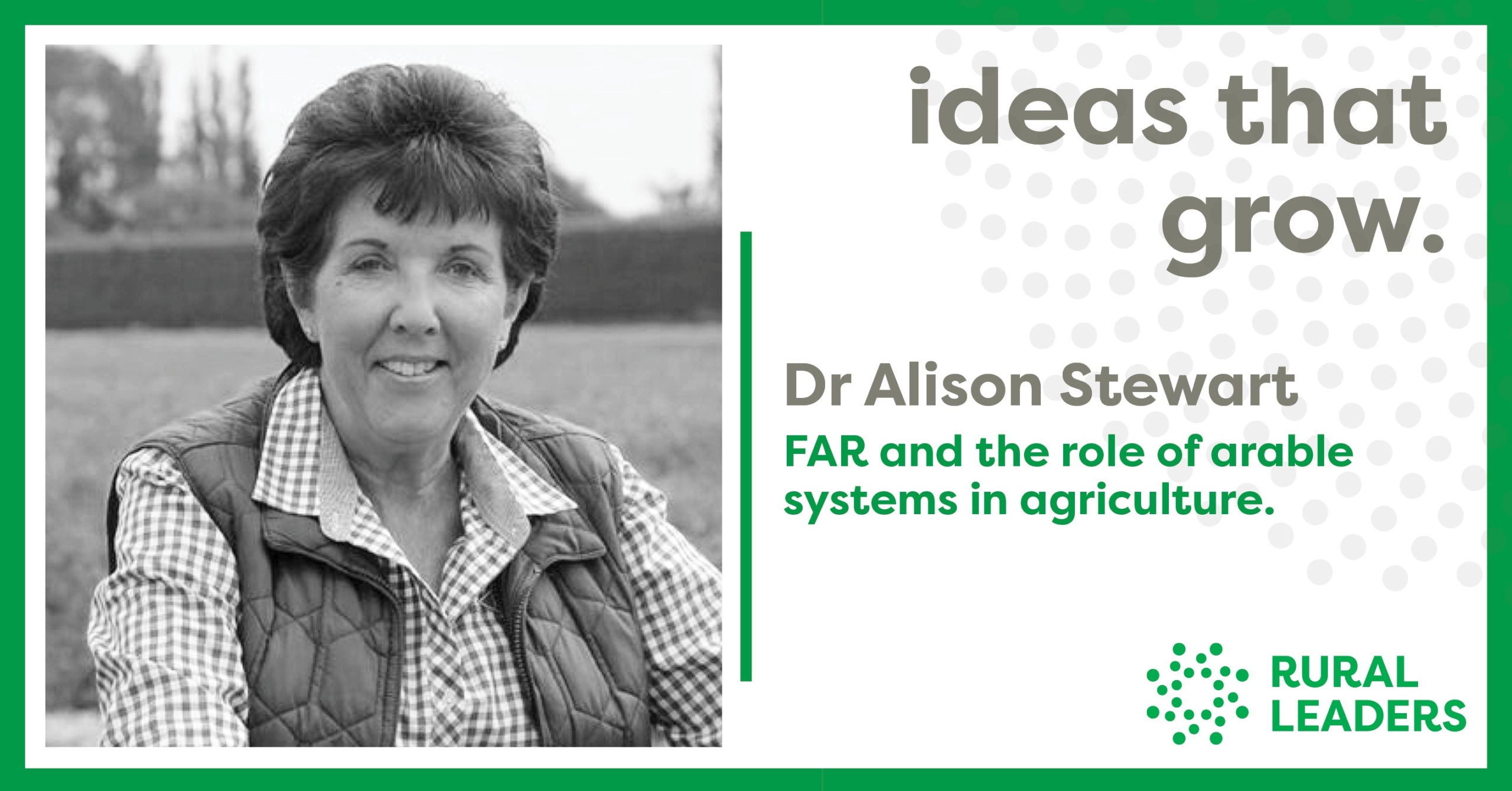Dr Scott Champion has a wealth of sector knowledge, gained not just from tenures at the top of organisations such as Beef+LambNZ, but from possessing a genuine passion for helping our rural leaders grow.
As Facilitator and Programme Director of the Kellogg Rural Leadership Programme, Scott plays a vital role lifting rural leadership capability.
Bryan Gibson – Managing Editor of Farmer’s Weekly.
Welcome to the ‘Ideas that Grow’ podcast. I’m Bryan Gibson, Managing Editor of Farmers Weekly. With me today is Dr Scott Champion, who is the programme leader for Kellogg. G’day, Scott. How’s it going?
Scott Champion – Facilitator and Programme Director of the Kellogg Rural Leadership Programme
Yeah good thanks Bryan. Great to be with you.
Bryan: We often talk to the scholars themselves about their individual research projects, but with the Kellogg Programme, you’re in charge of running the programme as a whole. How long have you been with Rural Leaders?
Running the Kellogg Rural Leadership Programme – what’s involved.
Scott: I’ve been running the programme for about five years now and had actually spoken at the programme as a guest speaker prior to that. So it’s been a real delight to be involved over the last five years. And it’s a programme now that’s been going for close on 50 years and has put through over 1000 graduates in that time.
Bryan: What’s involved in running the programme? Obviously, there’s attracting people to get involved, there’s organising their meetings and get-togethers and what they’re going to study and marking assignments. What else is there?
Scott: The focus really, from my time as course director, is on the face to face interaction and the way we connect between what we call phases. So the programme itself is divided into three of these phases.
The Kellogg Programme’s three phases – Phase One.
Scott: The first one is nine days long, second one is five days long, and then the third one is five days long. So they’re quite intense, particularly that first phase, across the nine days. So we run two programmes a year.
Each programme has about 24 participants. Sometimes it’s a little bit less, sometimes it’s a little bit more. And the focus in each of those, really the nine day intense phase one, is all about getting to understand concepts of leadership. Where also we use the analogy of a toolbox. We’re trying to give our Kellogg participants tools that they can use to go out and be more effective and contribute both into their own businesses or the business that they work in, but also in the sector more broadly.
We think about things like presentation skills, leadership models, and tools. And then also in that first phase, we’re trying to introduce them into aspects of the different components of the broader food and fibre sector that they might not be aware of.
For example, if you work in Horticulture, giving you an opportunity to understand what are the big picture issues that are happening in dairy and vice versa across that sort of plethora of industries that are operating in New Zealand. So that’s our focus around phase one.
Kellogg Phase Two.
Phase two is completely different. We come to Wellington, so I should say phase one and phase three are both typically held at Lincoln.
We come to Wellington for phase two, and that’s all about the economy, politics, and concepts of influence, models of government communications, the role of media, things like that.
Kellogg Phase Three.
Then in phase three, we come back to Lincoln again. I think you might have mentioned earlier, the Kellogg Scholars are undertaking a project through the five or six months that they’re on the Kellogg Programme and that’s on a topic of their own choosing.
It’s quite a significant piece of work and they’re presenting those back to the group. We also get some industry people coming along to those presentations and then we tie the programme together. So that’s the broader structure across the five or six months of the Kellogg Programme.
Bryan: So someone turning up, as a newly minted Kellogg Scholar, and that first phase one, those nine days, it’s sort of full on workshops and a lot of listening and a lot of talking, and you bring together people from all around the Sector, and all around the country into that?
What to expect on Kellogg.
Scott: Absolutely. We’re deliberately trying to do that and to get a real mix of different industries. So one of the things we’re trying to do is expose people beyond the boundaries of their day to day and give them an opportunity to think more broadly. So that’s pretty important to us.
It’s really interesting when you talk to the Kellogg Scholars at the end of the programme about what’s been most valuable. One of the things that they often talk about is the fact that they got to understand things outside the boundaries of the industry they typically work in.
What many of these people will do is they’ll be in that transition from technical roles to general management and focusing more on people and managing teams and those sorts of things. So creating that broader understanding and giving them an opportunity to think beyond their technical skill set is one of the things that we’re really trying to do. But the first nine days is quite full on. It’s a real immersion.
One of the things we try to do is have lots of speakers coming to present. We might have Chairs or CEOs or Directors, quite senior people from around the sector and make sure in those sessions we’re opening up lots of time for discussion and Q and A. It’s not just that monologue from the front.
One of the things I always say, is at the start of phase one, that you’re going to learn as much from one another as you do from those that you hear presenting at the front of the room.
The Kellogg Final Research Project.
Bryan: Do people applying to be Kellogg Scholars have an idea in mind of what they’re going to do their project on, or are those formed as the programme goes forward?
Scott: I guess the answer to that question is yes and no. So we do get Kelloggers to think about their project topic prior to joining us in Phase One. We kicked off a couple of weeks ago, and we actually ran a video conference prior to the start of the face to face programme to give them an opportunity to get more information on the nature of their projects, to do a bit of thinking about what they wanted to focus on when they came into Phase One.
Some of the conversations we have around project topics happen here. But often what people do is they’ve got a broad idea of the area that they want to work in, but as they get exposed to some of the content in Phase One, even as we head sometimes towards phase two, they’ll refine the topic, narrow it down, and get more focus. I think the answer, Bryan, is yes, they do. But often the interactions with one another, the interactions with the content, will help refine that and give it a real impact as they go through the programme.
Bryan: I’ve interviewed 20 or 30 of the Rural Leaders Scholars and a number of them said to me, I had what I thought was a fantastic idea for the project and after sitting through this or talking to one of my fellow Scholars, I realised that my angle was wrong and it went this way – and it was much better for it.
Scott: Absolutely. And you’re right, that’s often a point of feedback, and we talked about that at the start, just saying, this is probably going to happen and that’s fine. Be aware that your topic might change and shift a bit as you go through and you learn more and you start to think about things from other perspectives you might not have been exposed to before.
The Kellogg Rural Leadership Programme and the Nuffield New Zealand Farming Scholarship. What are the differences?
Bryan: Maybe it may not be clear to some, but what is the difference between a Kellogg and a Nuffield Scholarship?
Scott: Sure, it’s a great question which we get asked all the time. They’re quite different programmes. So the Nuffield Programme is a year-long experience. It’s individually directed.
The Nuffield Scholars are really focusing on a project topic and then designing their own experiences – gathering information and data as they write the report. So there’s a report that comes out of a Nuffield Scholarship as well. They design that themselves in conjunction with the trust and mentors that they’ve put together. Obviously, travel is a big component of a Nuffield. So going offshore, immersing in other agri-contexts is a really key part and has always been a key part of Nuffield.
The Kellogg Programme is six months long and more structured in the sense that we are running the phases I described previously. Where we have content that we’re putting in front of Kelloggers and getting them to think about and interact with. And their project is obviously shorter in duration and more compact in terms of what’s required. So Kellogg is more structured and shorter.
Scott: They’re different rather than staircasing one way or the other. In fact, recently we’ve had someone who had previously done a Nuffield Scholarship, come back and do the Kellogg Programme. There have been a number of people who’ve done Kellogg Programmes and then gone on to do Nuffield Scholarships. So, different in scope and focus, and I guess, the degree of self-direction that there is in them.
What academic support is available to Kellogg Scholars?
Bryan: I guess there are lots and lots of people in the food and fibre sector who would get really excited about leadership training and being in the room with all these people. They might be a bit daunted by the sort of academic aspect of putting together a large project. Is there support for that and how academic are they? How does that work?
Scott: There is support, absolutely. So I’m really fortunate to have a colleague, Dr Patrick Aldwell, who was previously one of the Deans at Lincoln. Patrick is involved in the programme. He was the Course Director prior to me and he still looks after the project component. Patrick’s enormously experienced in the sector, but also in terms of just how do you do a really good piece of research?
One of the things we say to our Kellogg Scholars is, look, you might not have done one of these before, and actually, you might not have to do another report like this again.
If you think about the core skillset that we’re trying to encourage you to experience and build into your toolkit, it’s about how do you identify a really great problem?
How do you define a solid research question or a problem definition around that?
How do you go out and collect data and talk to people and assemble information to analyse that? And then, how do you craft a really compelling response to what it is that you’ve been working on over the last six months and to respond to that research question?
If you can generalise those skills, they can be used in a really significant array of different contexts, whether that’s a family, farming or growing business. Whether that’s working with a bunch of colleagues, whether that’s reporting up to a management team, a senior leadership team, or a board. That logic and argument is something we’re really trying to give people an opportunity to experience.
Yes, lots of support, and I think, as we say, even if you haven’t done it before, and even if you’re not doing it again, there are really core skills here about logic and how you create really compelling arguments to have impact and influence as well.
Kellogg Programme Director Scott Champion – background.
Bryan: Now, you yourself have a background in academic study, and you’ve been at the top of industry good groups in New Zealand. Tell us a little bit about how your journey to where you are now.
Scott: As you can probably tell, I’m an Australian from the accent, which hasn’t faded. I’ve been here for about 20 years now, so I’m a city kid who did agriculture, sort of stumbled across agriculture when I was trying to work out what I wanted to do when I finished school.
I’ve just had a really wonderful professional career and opportunities to date. I love the broader food and fibre sector and have had fabulous experiences here in New Zealand. I did an undergraduate degree at the University of New South Wales in Sydney and it’s actually a programme that doesn’t exist anymore. It was called Wool and Animal Science. It had a sort of a textile component – as well as an Ag component.
My technical background is in wool and I then did a PhD in Animal nutrition and ended teaching after that in the School of Agriculture at the University of Tasmania in Hobart.
The school had lots of really close connections with industry and Tasmania’s economy was a lot like New Zealand’s. Very food and fibre dependent. I was teaching Animal Nutrition and Physiology and Introduction to Ag and Hort. I did that for six years.
New Zealand and the path to Kellogg.
Scott: I then came across here to New Zealand to work for the New Zealand Merino Company, as Research, Development and Product Innovation Manager. I had four and a half years there. Again, wonderful experience working with a great bunch of people who were doing interesting things and really trying to think about Merino fibre in a different way and that tight connection to growers.
Then I went to the industry body, which was then Meat and Wool New Zealand, which then became Beef+LambNZ. I had ten years there. I had a GM role, looking after policy and promotion, and then the last seven and a half years as CEO.
Then almost seven years ago now, we started a little consulting practise called Primary Purpose. There are three of us in the business. We describe ourselves as sort of a niche research, advisory and analytics firm, working across food and fibre in New Zealand.
So, yeah, we work across all of the sort of major industries and then for about probably a quarter to a third of my time, is the Kellogg work. So it’s a lovely mix.
Bryan: Now, having led Beef+LambNZ for quite a long time and then being away from it for a while, what are your thoughts on the industry group’s advocacy efforts in the last few years and do you think the criticism of them is valid?
Common challenges beyond the boundary fence.
Scott: I’ve been thinking about this a bit lately having had a number of conversations with people, that in my time, so almost seven years ago I left, a lot of the focus was around productivity improvement.
In my time with Beef and Lamb, I think from memory, it was the 2006/2007 season, was sort of the worst year in 50 years in real terms for profitability in the sheep and beef sector.
So that’s, how do we stay profitable as individual farming businesses and how do we stay in the game? The challenges around that was a real theme that ran through my time there. One of the things that really strikes me now is, we look at the dominant conversations that hit the front pages of your publications, and we talk about them in the Kellogg Programme too.
There are these big cross sector issues around environment, animal welfare, social licence and all of the different components of that. How do we maintain that social licence with the public onshore and offshore in our export markets to continue to be able to export and deliver the products that people want?
It’s a really significant shift. The boundaries of the problems now and the things that we talk about, they don’t line up with the boundaries of an individual business. They don’t stop at an individual farm or an orchard’s fence line. How you deal with that is quite challenging. The ability of the sectors to work with one another and operate with one another, I think is really critical.
We’ve seen various models and approaches like that developed over the last while. That feels like it’s quite different to what it was ten years ago, 15 years ago, in terms of what’s required, in terms of focus, but also at an individual farm and business level. Of course, there’s still the requirement to make those individual productivity improvements and to focus on the business and stay in the game.
So one of the things that has been pretty challenging, both for individual businesses, and for the service sector and also for the industry bodies, is it’s an ‘and’ conversation as well as supporting individual businesses to continue to improve. We have to connect across the sector to address these big cross sector issues as well. So it’s a pretty full agenda.
Gaining perspectives on the sector’s big challenges with Kellogg.
Bryan: I think that point you made about these issues being far wider than the boundary fence is quite important, because I almost feel that if more in the industry did the Kellogg Programme, they’d realise at the moment, a lot seem to take the ‘my farm’ attitude to an all of world issue.
Whereas if you had a more holistic view of what consumers are feeling overseas, the social licence position in New Zealand, then there would be a different perspective on things.
Scott: Yes. I think one of the responses we often get, and we run a little activity on the last day of the Kellogg Programme with a conversation about what was most valuable to you as you’ve gone through the programme. One of the responses we’ll often get from participants is ‘I got insights into other sectors beyond my own and I learnt that I can generalise and they’re actually dealing with many of the same issues that I am’.
So the context might be different if I go from horticulture, to dairy, to sheep and beef, to forestry, whatever it might be. But if I push that level up, that issue up, and think about it at a slightly more strategic level, there are really similar things here that we’re trying to grapple with.
I think when you do that, it does give you opportunity to connect with others, to get different insights, to think about things in different ways.
So, in terms of the context of the Kellogg Programme, what we’re trying to do with our 50 or so Scholars each year, is to get them to think about ‘how do I look across to other sectors and other places and beyond the boundaries of food and fibre as well other things going on in tech or manufacturing or whatever it might be.
Where I go, the context is a bit different, but actually, there’s an analogy there. There’s something I could really learn from that. I think about how to adapt it. I might be able to bring it back into my own context and do something a bit better, or a bit faster, or with a bit more impact, or whatever.
The Kellogg Programme in 2023.
Bryan: All right, so two and intakes a year into the Kellogg Programme. So I guess you’ve got another cohort kicking off mid-year, is that right?
Scott: Yeah, sometimes three intakes, but that’s right. We kicked off our last programme two or three weeks ago, last week of January, first week of February. That programme goes through to July, and actually we start our second programme of the year just before we finish our first programme of the year. So we’ll have a programme running from mid-June through to the end of November. Applications are closing, I think about 16 April, for that second programme of the year.
Bryan: So anyone interested can get all the details on the Rural Leaders website, I guess?
Scott: Absolutely. If they go and have a look at the Rural Leaders website, they’ll see some blue coloured links there through into the Kellogg Programme, and that will give them all the details.
Thanks for listening to ‘Ideas that Grow’ the Rural Leaders Podcast in partnership with Massey and Lincoln Universities, and Agmardt. This podcast was presented by Farmers Weekly.
